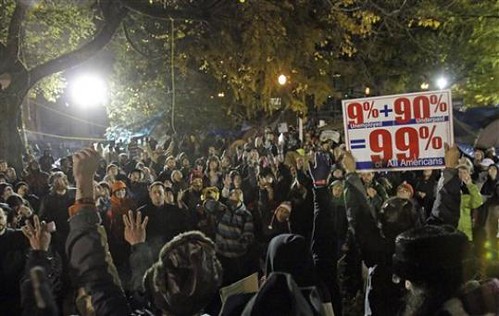
Occupy Portland movement mobilizes in face of threats by the city administration to evict them from a park that is the center of the anti-capitalist struggle in the city. Threats against the movement have escalated over the last few weeks., a photo by Pan-African News Wire File Photos on Flickr.
November 26, 2011
For Occupying Protesters, Deadlines and Decisions
By BRIAN STELTER
New York Times
PHILADELPHIA — Cooperative is the word usually used here to describe the relationship between the campers of Occupy Philadelphia and the city, where the constitutional right to free speech and assembly was adopted 224 years ago.
The arguments and arrests that have occurred at protests in New York and other cities have been largely absent. Mayor Michael A. Nutter even visited the encampment on its first night and pledged to work with the movement when possible.
But the limits of that cooperation are about to be tested. Following the example of other cities that have taken steps to evict the Occupy camps, Mr. Nutter, citing health and safety concerns and an imminent construction project, said the protesters must pack up and leave the steps of City Hall by Sunday evening.
“We cannot allow current conditions, including masses of tents and 24-hour-a-day camping, to continue,” Mr. Nutter said at a news conference on Friday.
Saturday, however, looked nothing like a moving day at the plaza, where protesters said the deadline had focused the local movement’s otherwise disorganized energies. “Having this kind of pressure is a good thing,” Michael Pierce, 50, a member of Occupy Philadelphia’s information working group, said between conversations with campers and the occasional lost tourist looking for the Reading Terminal Market or Rittenhouse Square.
“Without some of the struggles that the other cities have had, we’ve been sitting around, drinking coffee,” Mr. Pierce said. “This is bringing us back together.”
Amid unseasonably warm temperatures on Saturday, a sort of informal brainstorming took place before an “eviction planning meeting.”
Come Sunday, should the protesters accept the city’s proposal for a part-time occupation across the street, bringing a new phase of the movement without overnight camping? Should they stay at the site, inviting an attention-getting confrontation with the police? Or should they join a march of the homeless to a nearby rail yard? (Dennis Payne, a homeless man who was spreading the word about the march, said he wanted to move other homeless people “out of the way” of a potential clash.)
Partly joking, Mr. Pierce said he would like to see protesters move to Rittenhouse Square, one of the city’s wealthiest pockets. There, he said, “a lot more of the right kind of people would get annoyed.”
Similar conversations were taking place in Los Angeles, where Mayor Antonio R. Villaraigosa said Friday that protesters, who had been allowed to remain on the lawn outside City Hall for almost two months, had to disperse by 12:01 a.m. Monday. A Twitter page for the Occupy L.A. movement put out a call on Friday evening for “back up” from other Occupy-aligned groups in California.
In Philadelphia, Mr. Nutter gave the group a deadline of 5 p.m. Sunday. Dilworth Plaza, where hundreds have been staying since Oct. 6, is about to become a construction site. Mr. Nutter, adopting the movement’s language, said the project would be “built by the 99 percent for the 99 percent.”
Some of the protesters said they were aware when they set up their tents in October that the construction project — a $50 million refurbishment that will replace the concrete plaza with green space and, in the winters, an ice skating rink — might be imminent. That they chose to set up there anyway set off one of the initial disagreements within the movement.
“All along, like in other cities, there have been factions that have wanted to compromise with the authorities and factions that have wanted to be more disruptive,” said Jim MacMillan, a journalist-in-residence at Swarthmore College who has observed the occupation since the beginning.
After about a month, city officials started to speak about what they considered unsanitary conditions at the site. Police were called on Nov. 12 after a female protester said she was sexually assaulted in her tent.
There are about 250 tents still at the site, although one group, which calls itself Reasonable Solutions, pulled out recently. Will Tucker, 33, one of the organizers of Reasonable Solutions, said he felt that some of the other protesters were “looking for conflict” and refusing to communicate with the city.
Last week, the city approved a demonstration permit for Mr. Tucker’s group and rejected one submitted by a rival organization, which led to accusations that Reasonable Solutions had been co-opted. The new permit, effective Monday, allows for protests at a plaza across the street from City Hall, but only between 9 a.m. and 7 p.m. No overnight activity would be allowed, though three daytime tents and an office trailer would be. Referring to overnight camping, Mr. Tucker said, “We thought that wouldn’t be logical in the wintertime anyway.”
On Saturday, protesters predicted that most people would move to the new plaza — and try to stay there overnight. Given the peaceful history of the local protests, Mr. MacMillan said he thought that some would resist the eviction on Sunday, but that the number would be small. He predicted that the police would not clear the plaza until after the 11 p.m. local newscasts.
In the meantime, said Dave Burnett, 38, a protester who is a meat clerk at a local grocery store, “it’s a great advertisement for us.”
“It’s one of those protests we don’t have to organize,” he said. “The city’s doing it for us.”
No comments:
Post a Comment